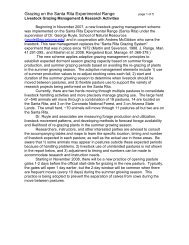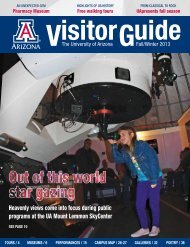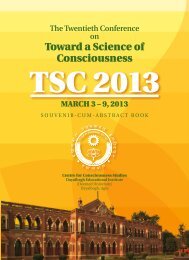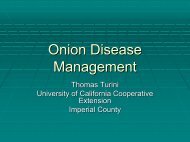CONSCIOUSNESS
Download - Center for Consciousness Studies - University of Arizona
Download - Center for Consciousness Studies - University of Arizona
- No tags were found...
Create successful ePaper yourself
Turn your PDF publications into a flip-book with our unique Google optimized e-Paper software.
192 5. Experiential Approaches<br />
coauthor replications, comparative studies and meta-analyses, could address these concerns<br />
directly. Until they are addressed however, meditation-related research and methodologies<br />
cannot be expected to live up to their promise. P11<br />
288 Purification of Consciousness through the Exercise of Will Power in Pranahuti<br />
Aided Meditation: A Phenomenological Study of its Effectiveness Wandan (Wendy)<br />
Zeng, Dr. Sastry Bhamidipati (East West Psychology, California<br />
Institute of Integral Studies, San Francisco, CA)<br />
When we apply our intellect and involve our heart’s feelings in thinking processes or<br />
actions, we form impressions in our consciousness. An impression, by the Random House<br />
dictionary’s definition, is the first and immediate effect of an experience or perception upon<br />
the mind, or the strong effect produced on the intellect, feelings, conscience, etc. In reality,<br />
the term ‘impression’ could have a broader meaning and reside in a deeper level of our consciousness.<br />
According to Sri Ramchandra, the founder of the system of Natural Path, there are<br />
three categories of impressions. These are: 1) Mala, nascent impressions we form in our dayto-day<br />
activities, caused by a lack of control over the senses that manifests itself as laziness,<br />
sloth, attraction to trivia and other impulsive tendencies to sensory pleasure; 2) Vikshepa,<br />
unreal projections of desires for enjoyment, such as greed, avarice, jealousy and so forth [1];<br />
3) Avaranas, layers of grossness due to past deeply rooted impressions that affect different<br />
sheaths of our being and lead to the formation of habits. Consequently, we experience positive<br />
or negative resulting effects of the impressions and that is the fruition process. The resulting<br />
effects could be enjoyment, pleasure, stress, tension, restlessness of the mind, dullness or lack<br />
of clarity in thoughts, emotions associated with unreal projections, and unwanted habits from<br />
which we seem to have little power to extricate ourselves. Cleaning or purifying ourselves<br />
in the realm of the mind ‘is more important than the physical cleaning which is necessary<br />
of good health’ [2]. The fact that purification of our consciousness is possible has been little<br />
known to most people. This paper is a qualitative phenomenological study of the effectiveness<br />
of certain techniques, such as ‘Ocean of bliss’ discovered by Sri Ramchandra, that enable<br />
people to purify their own consciousness through the exercise of their will power. We interviewed<br />
eleven individuals about their personal experiences of this daily half-hour practice.<br />
The study found that the immediate effects include the feelings of lightness, freshness and<br />
calmness. Over a period of practice, it led to several improvements, such as the calming of<br />
restless tendencies, the reduction of ego, stress relief or de-tensioning, an increase in clarity of<br />
thought, and the reduction of unreal projections. The study found that this practice is a significant<br />
help in removing certain mental, emotional and psychological obstacles in the evolution<br />
of an individual’s consciousness towards union with their inner highest spirit. Bibliography:<br />
[1] K.C. Narayana. Bodhayanti Parasparam (Mutual Learning and Teaching). 3rd ed. Vol.<br />
1. Secunderabad: Sri Ramchandra Publishers, 2003. Print. [2] K.C. Narayana. Bodhayanti<br />
Parasparam (Mutual Learning and Teaching). 3rd ed. Vol. 2. Secunderabad: Sri Ramchandra<br />
Publishers, 2003. Print. P5<br />
5.3 Hypnosis<br />
5.4 Other altered states of consciousness<br />
289 Shamanic States of Consciousness Compliment Transpersonal Psychology On<br />
Spiritual Emergency and Avoid Hospitalization Samuel Breidenbach<br />
(Tucson Scientific Shamanism Center, Tucson, AZ)<br />
It is possible that many ‘Clinically Diagnosed’ cases of aberrant behavior may fit the<br />
model believed by transpersonal psychologists and accepted under DSM-IV as ‘Spiritual<br />
Emergency’ that can be treated equally well, and often with longer lasting positive results<br />
with Western version techniques of successful indigenous shamanism. This approach is called<br />
‘Scientific Shamanism.’ In fact we will show that many cases could well fall under the heading<br />
of spiritual emergence rather than spiritual emergency. No clinic treatment is needed for a<br />
Spiritual Emergence, though the symptoms are very close to clinical schizophrenia. A ‘spiri-







